- Home
- Milan Kundera
The Book of Laughter and Forgetting Page 4
The Book of Laughter and Forgetting Read online
Page 4
Having explained all this to Marketa, she announced that Marketa was beautifully "built" and that this was very rare, because few women, Eva thought, had really beautiful bodies. Her praise slipped out so naturally that Marketa took more pleasure in it than in a compliment from a man. The girl had turned her head. She felt she had entered the realm of sincerity, and made a date to meet Eva in the sauna at the same time the day after next. Later, she introduced her to Karel, but in this friendship he was always in third place.
"My mother-in-law is staying with us," Marketa told her guiltily as they left the railroad station. "I'm going to introduce you as my cousin. I hope it doesn't bother you."
"On the contrary," said Eva, and then asked Marketa to brief her on her family.
3
Eva arrived after lunch. Marketa had gone to pick her up at the railroad station, because she thought of her as her friend. She didn't like Karel's girlfriends. But things were different with Eva. Actually, Marketa had met her first.
That was about six years before. She and Karel were at a spa. Every other day, she went to the sauna. Bathed in sweat, she was sitting in the cabin on a wooden bench along with other women when a tall, naked girl came in. Though strangers to each other, they exchanged smiles, and in a moment the young woman began talking to Marketa. Because she was so straightforward and Marketa so grateful for that expression of affinity, they quickly became friends.
Marketa was captivated by the charm of Eva's singularity: That way of speaking to her immediately! As if they had made a date to meet there! And she didn't waste time starting the conversation with conventional remarks about how healthy the sauna is and how good for the appetite, but instead began right away to talk about herself, a bit like people becoming acquainted
42
43
The Book of Laughter and Forgetting
Mama
4
Mama had never been much interested in her daughter-in-law's family, but the words "cousin," "niece," "aunt," and "granddaughter" warmed her heart: they were in the comfortable sphere of familiar notions.
What she had long known was being confirmed: her son was an incorrigible eccentric. As if her being here at the same time as a visiting relative could disturb them! She realized they would want to chat by themselves. But that was no reason to send her away a day early. Fortunately, she knew how to deal with them. She simply decided she had been mistaken about the day of departure, and had chuckled a bit over that nice Marketa's inability to tell her to leave on Sunday morning.
Yes, she had to admit they were nicer than before. A few years earlier, Karel pitilessly would have told her to leave. Her little ruse of the day before had actually done them a great service. This time, at least, they wouldn't have to blame themselves for having sent their mother, for no reason at all, back to her loneliness a day early.
Besides, Mama was very glad to have met this new relative. She was a very nice girl. (And it was incredible how she reminded her of someone, but who?) For a good two hours, Mama had answered her questions. How did Mama wear her hair as a girl? She had a braid. Of course, it was still in the old days of Austria-
44
Hungary. Vienna was the capital. Mama went to a Czech high school, and Mama was a patriot. And all of a sudden she had longed to sing them some of the patriotic songs they sang at that time. Or to recite the poems! She surely still knew many of them by heart. Right after the war (yes, of course, after the 1914 war, in 1918, when the Czechoslovak Republic was established, my God, the cousin didn't even know when the republic was proclaimed!), Mama had recited a poem at a school ceremony. They were celebrating the end of the Austrian Empire. They were celebrating independence! And would you believe it, all of a sudden, having come to the last stanza, her mind went blank; she couldn't remember what followed. She fell silent, sweat ran down her brow, she thought she would die of shame. And then all at once, unexpectedly, there was a great burst of applause! Everybody thought the poem was over, nobody noticed the last stanza was missing! Even so, Mama was in despair, and, ashamed, she ran and locked herself in the toilet and the principal himself rushed to find her and kept banging on the door, begging her not to cry and to come out, because she had been a great success.
The cousin laughed, and Mama stared at her for a long time: "My God, you remind me of someone, who is it you remind me of ..."
"But you weren't still going to high school after the war," Karel remarked.
"I should know, it seems to me, when I went to high school!"
45
The Book of Laughter and Forgetting
Mama
"But you graduated in the last year of the war. It was still under Austria-Hungary."
"I know very well when I graduated," she answered with irritation. But even as she said it, she knew Karel was not mistaken. It was true, she had graduated during the war. Where then did the memory of that postwar school ceremony come from? Suddenly Mama hesitated and fell silent.
Marketa broke the brief silence. She spoke to Eva, and what she said concerned neither Mama's recitation nor 1918.
Mama felt abandoned among her recollections, betrayed by the sudden lack of interest and by the failure of her memory.
"Have a good time, children, you're young and have a lot of things to talk about." Abruptly a victim of discontent, she went off to her grandson's room.
some years later. One day, he received a letter at his office from a woman unknown to him. She said she knew him by sight and had decided to write to him because social conventions meant nothing to her when she was attracted to a man. She was attracted to Karel, and she was a man-chaser. A chaser of unforgettable experiences. She did not allow love. Only friendship and sensuality. Enclosed with the letter was a photo of a naked girl in a provocative pose.
Suspecting a practical joke, Karel at first hesitated to answer. But finally he was unable to resist. He wrote to the young woman and invited her to a friend's studio apartment. Eva arrived, tall, thin, and badly dressed. She looked like an oversized adolescent who had put on her grandmother's clothes. Seated across from him, she explained that social conventions meant nothing to her when she was attracted to a man. That she allowed only friendship and sensuality. Signs of embarrassment and effort showed on her face, and Karel felt a kind of fraternal compassion for her rather than desire. But then he told himself that no opportunity should be missed:
"That's wonderful," he said to reassure her, "a meeting of two chasers."
These were the first words with which he finally interrupted the young woman's voluble confession, and Eva immediately regained her courage, relieved of the burden of a situation she had heroically borne all alone for nearly a quarter of an hour.
He told her she was beautiful in the photo she had
5
While Eva was plying Mama with questions, Karel looked at her with tender affection. In the ten years he had known her, she had always been like that. Straightforward and dauntless. He had become acquainted with her (he and Marketa were still living with his parents) nearly as quickly as his wife had
46
47
The Book of Laughter and Forgetting
sent and asked (with a chaser's provocativeness) if it aroused her to show herself naked.
"I'm an exhibitionist," she said in all innocence, as if she were avowing that she was an Anabaptist.
He told her he wanted to see her naked.
Relieved, she asked if there was a record player in the studio.
Yes, there was a record player, but Karel's friend liked only classical music—Bach, Vivaldi, and Wagner operas. Karel would have found it odd for the young woman to undress to Isolde's singing. Eva too was displeased with the records. "Isn't there any pop music here?" No, there wasn't any pop. Finding no other solution, he ended up putting a Bach suite on the record player. He sat down in a corner of the room for a panoramic view.
Eva tried to move rhythmically, but soon said that you
couldn't with such music.
Raising his voice, he responded harshly: "Shut up and strip!"
Bach's celestial music filled the room, and Eva continued to move obediently. That music, everything but danceable, made her performance especially painful, and Karel thought that from the moment she pulled off her sweater to the moment she removed her underpants, the distance she had to cover must have seemed endless to her. The music played on, and Eva writhed in syncopated dance movements, throwing one piece of clothing off after the other. She didn't look at Karel, concentrating entirely on herself and on her gestures
48
Mama
like a violinist playing a difficult piece by heart and afraid of being distracted by seeing the audience. When she was entirely naked, she turned to face the wall and grabbed herself between her legs. Karel had already undressed and was ecstatically watching the masturbating young woman's back. It was glorious, and so it is easily understandable that ever since he has always taken Eva's side.
Besides, she was the only woman who wasn't annoyed by Karel's love for Marketa. "Your wife should understand that you love her but you're a woman-chaser and your chasing is no threat to her. But no woman understands that. No, there isn't a woman who understands men," she added sadly, as if she herself were a misunderstood man.
Then she offered to do everything she could to help him.
6
The boy's room, where Mama had gone, was barely six meters away and separated from them by only two thin walls. Mama's shadow was still with them, and it oppressed Marketa.
Fortunately, Eva was talkative. It was a long time since she had seen them, and many things had hap-
49
The Book of Laughter and Forgetting
pened: she had moved to another town and, most important, had married an older man, who had found an irreplaceable friend in her, for, as we know, Eva had a great gift for companionship and rejected love, with its selfishness and hysteria.
She also had a new job. It paid well enough, but it scarcely gave her time to breathe. She had to be back at work tomorrow.
Marketa was appalled. "What! But when do you want to go?"
"There's an express at five."
aMy God, Eva, you 11 have to get up at four! That's horrible!" And just then she felt, if not anger, at least a kind of bitterness at the idea that Karel's mother had stayed with them. Living far away and with little time at her disposal, Eva had nonetheless reserved this Sunday for Marketa, who was unable to devote herself to her as she wished because of the phantom mother-in-law who was always with them.
Marketa's good mood had now been spoiled, and as it never rains but it pours, the telephone started ringing. Karel picked up the receiver. His voice was hesitant, there was something suspect and equivocal about his terse replies, giving Marketa the impression he was choosing his words carefully, to hide their meaning. She was certain he was making a date with a woman.
"Who was that?" she asked. Karel said it was a colleague, a woman in a nearby town who was coming that week to discuss something with him. From then on, Marketa did not say a word.
50
Mama
Was she that jealous?
When they were first in love, she unquestionably had been. But years had passed and what she experienced now as jealousy was probably only a habit.
Putting it another way: every love relationship rests on an unwritten agreement unthinkingly concluded by the lovers in the first weeks of their love. They are still in a kind of dream but at the same time, without knowing it, are drawing up, like uncompromising lawyers, the detailed clauses of their contract. O lovers! Be careful in those dangerous first days! Once you've brought breakfast in bed you'll have to bring it forever, unless you want to be accused of lovelessness and betrayal.
In the first weeks of their love, it was decided between Karel and Marketa that Karel would be unfaithful and Marketa would accept it, but that Marketa would have the right to be the better of the two and Karel would feel guilty toward her. No one knew better than Marketa how sad it is to be better. She was better, but only for lack of anything better.
Deep down, of course, Marketa knew full well that in itself the telephone conversation meant nothing. The important thing was not what the conversation was but what it represented. With eloquent concision, it expressed the entire situation of her life: everything Marketa did she did for Karel and because of Karel. She took care of his mother. She introduced him to her best friend. She gave her to him as a gift. Solely for him and for his pleasure. And why did she do all that?
51
The Book of Laughter and Forgetting
Why did she give herself pain? Why like Sisyphus did she keep pushing her boulder uphill? Whatever she did, Karel was mentally absent. He made a date with someone else and always eluded her.
In high school, she had been untamable, rebellious, almost too full of life. Her old math teacher liked to tease her: "Marketa, no one will be able to rein you in! I already feel sorry for the man you marry!" She laughed proudly, his words seeming to be a happy omen. And all at once, without knowing how, she ended up in an entirely other role, contrary to her expectations, contrary to her wishes and her taste. And all this because she hadn't been on her guard during the week when she had unwittingly drawn up the contract.
She no longer enjoyed being better. Suddenly all the years of her marriage landed on her like a heavy sack.
Mama
what, this time, was an all too obvious injustice, Karel obstinately kept silent. Because she was unable to con-trol her bitterness or tolerate her husband's anger, Marketa got up and went into the kitchen.
Eva meanwhile tried to persuade Karel not to spoil an evening they had been looking forward to for so long. But Karel was inflexible: "The time comes when you can't go on anymore. Fm getting tired of this! Fm always being accused of something or other. Fm not interested anymore in always being made to feel guilty! And guilty of such trivia! Trivia! No, no. I can't stand the sight of her anymore. I can't stand it!" Going around in circles, he repeated that again and again, and refused to listen to Eva's imploring intercessions.
So she finally left him alone and went off to join Marketa, who, hiding in the kitchen, knew that what had happened need not have happened. Eva tried to show her that the telephone call in no way justified her suspicions. Marketa, who deep down knew full well that this time she had no grounds for them, replied: "But I can't go on anymore. It's always the same. Year after year, month after month, nothing but women and lies. Fm getting tired of it. Tired. I've had enough of it.'
Eva realized that husband and wife were equally stubborn. And she decided that the vague idea she had had in coming here, and whose decency had at first appeared questionable, was a good one after all. If she wanted to help them, she should not be afraid to act on her own initiative. They loved each other, but they
53
7
Marketa was increasingly sullen, and Karel's face showed signs of anger. Eva was panic-stricken. She felt responsible for their marital happiness and talked all the more to disperse the clouds gathering in the
room.
But the task was beyond her strength. Outraged by
52
The Book of Laughter and Forgetting
needed someone to relieve them of their burden. Someone to free them. So the project she had come here with was not only in her own interest (yes, undeniably it served her own interest above all, and that was just what worried her a bit, since she never wanted to behave selfishly toward her friends) but also in Marketa and Karel's interest.
"What should I do?" asked Marketa.
"Go find him. Tell him to stop sulking."
"I can't stand it. I can't stand the sight of him anymore!"
"Then lower your eyes. That'll be all the more touching."
Mama
"If you go and say good night to her, she'll start up again with her chatter and we'll lose still another hour. You know Eva
has to get up early."
Marketa thought they had already lost too much time; she took her friend by the hand and, instead of going to say good night to Mama, went into the bathroom with Eva.
Karel stayed in the room, alone with Ellington. He was happy the clouds had dispersed but was expecting not hing more this evening. That bit of an incident over the telephone call had suddenly revealed something he had refused to acknowledge: he was tired and no longer desired anything.
Some years ago, Marketa had urged him to make love in a threesome with her and a mistress of his she was jealous of. Her proposal made him dizzy with arousal! But the evening scarcely gave him any pleasure. On the contrary, it was a horrible effort! The two women were kissing and embracing each other in front of him but never for a moment ceased to be rivals vigilantly watching to see which one he was more atten-tive to, which one he was more tender with. He care-fully weighed his every word, measured his every caress, and behaved more like a scrupulously considerate, solicitous, courteous, and impartial diplomat than like a lover. At any rate, he failed. First his mis-tress burst into tears right in the midst of the love-making, and then Marketa shut herself into a deep silence.
If he could have believed that Marketa needed their
55

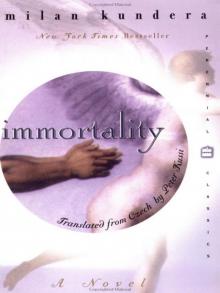 Immortality
Immortality Dr. Havel After Twenty Years
Dr. Havel After Twenty Years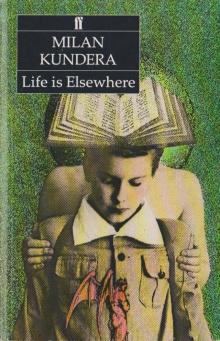 Life Is Elsewhere
Life Is Elsewhere Laughable Loves
Laughable Loves Symposium
Symposium Ignorance
Ignorance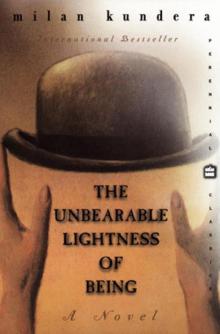 The Unbearable Lightness of Being
The Unbearable Lightness of Being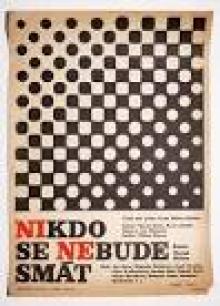 Nobody Will Laugh
Nobody Will Laugh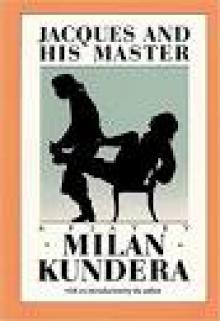 Jacques and His Master: An Homage to Diderot in Three Acts
Jacques and His Master: An Homage to Diderot in Three Acts The Golden Apple of Eternal Desire
The Golden Apple of Eternal Desire Eduard & God
Eduard & God Slowness
Slowness Let the Old Dead Make Room for the New Dead
Let the Old Dead Make Room for the New Dead Farewell Waltz
Farewell Waltz Testaments Betrayed: An Essay in Nine Parts
Testaments Betrayed: An Essay in Nine Parts